Exploring Gardeners in Forest Hill: A Comprehensive Guide
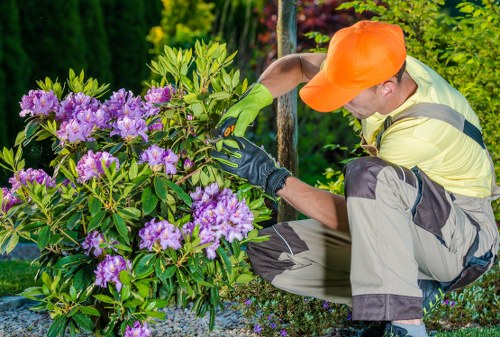
Forest Hill, a serene suburb nestled in the heart of the city, is renowned for its vibrant gardening community. Gardeners in Forest Hill enjoy a unique blend of urban convenience and lush green spaces, making it an ideal location for both novice and experienced gardeners.
The area boasts a variety of community gardens, nurseries, and gardening clubs that foster a strong sense of camaraderie among enthusiasts. Whether you're interested in ornamental plants, organic gardening, or sustainable practices, Forest Hill offers ample resources to support your green thumb.
In this guide, we'll delve into the best gardening spots, essential tips, and the supportive community that makes Forest Hill a haven for gardeners.
The Best Gardening Spots in Forest Hill
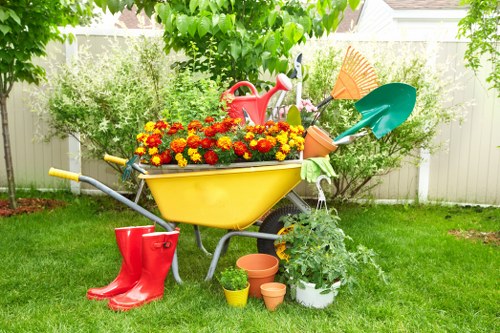
Community Gardens
Forest Hill is home to several community gardens where residents can rent plots to cultivate their plants. These gardens are not only great for growing vegetables and flowers but also serve as social hubs where gardeners can share knowledge and resources.
One popular community garden is the Forest Hill Green Space, which offers well-maintained plots, access to communal tools, and regular workshops on various gardening topics.
Participating in community gardens is an excellent way to connect with fellow gardeners and gain hands-on experience.
Local Nurseries and Plant Shops
For those looking to find high-quality plants and gardening supplies, Forest Hill boasts several local nurseries and plant shops. These establishments provide a wide selection of native plants, seasonal flowers, and organic fertilizers.
The Forest Hill Plant Co. is a favorite among locals for its knowledgeable staff and diverse inventory. They offer personalized advice to help gardeners select the best plants for their specific needs and environments.
Supporting local nurseries not only ensures you get the best products but also contributes to the community's sustainability efforts.
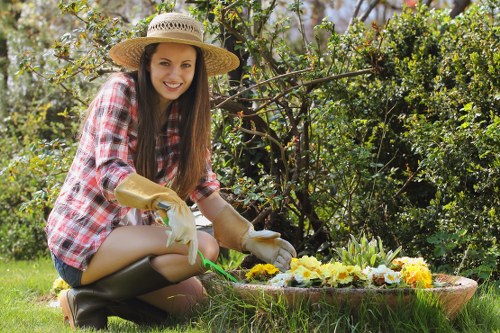
Gardening Clubs and Workshops
Engaging with gardening clubs in Forest Hill can enhance your gardening skills and knowledge. These clubs often organize events, workshops, and plant swaps, providing valuable opportunities for learning and networking.
The Forest Hill Botanical Society, for example, hosts monthly meetings where members discuss various gardening techniques, share success stories, and plan community projects.
Workshops on topics like composting, pest control, and landscape design are regularly held, making it easy for gardeners to stay informed about the latest trends and best practices.
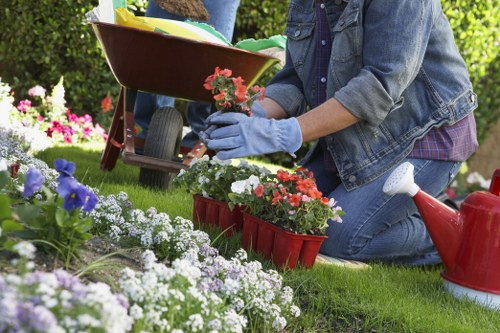
Sustainable Gardening Practices
Forest Hill gardeners are increasingly adopting sustainable practices to promote environmental health and reduce their carbon footprint. Techniques such as rainwater harvesting, composting, and the use of native plants are common among the community.
Rain barrels are a popular addition to gardens, allowing gardeners to collect and reuse rainwater for irrigation, thereby conserving water resources.
Composting organic waste not only reduces landfill contributions but also enriches the soil, enhancing plant growth naturally.
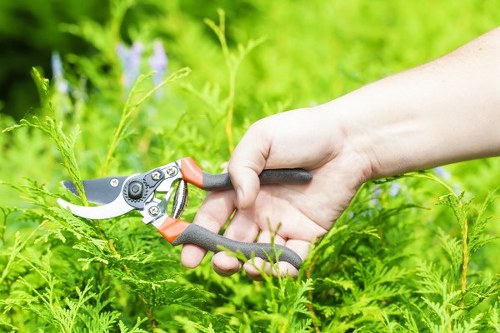
Seasonal Gardening Tips
Understanding the seasonal changes in Forest Hill is crucial for successful gardening. Each season offers unique challenges and opportunities for different types of plants.
Spring: A great time for planting annuals, vegetables, and fruit trees. Preparing the soil with organic matter can boost plant health.
Summer: Focus on watering strategies and pest management to keep plants thriving during the hotter months.
Autumn: Ideal for planting perennials and preparing gardens for the winter. Mulching can protect plants from frost.
Winter: While growth slows, it's a perfect time for planning and designing new garden projects for the upcoming year.
Nearby Areas to Forest Hill for Gardeners
Gardeners in Forest Hill are fortunate to be surrounded by numerous nearby areas that offer additional gardening opportunities and resources. Here are some of the top nearby areas:
- Maplewood: Just a 10-minute drive from Forest Hill, Maplewood features expansive parks and a renowned botanical garden.
- Riverside: Known for its riverside gardens and water conservation programs, Riverside is perfect for gardeners interested in aquatic plants.
- Sunnyvale: Offers a variety of community gardens and hosts an annual flower festival that attracts gardening enthusiasts from all over.
- Oakridge: Home to several nurseries and a vibrant horticultural society that organizes regular workshops and plant exchanges.
- Lakeside: Features lakeside planting areas and specializes in native flora, making it a great spot for sustainable gardening practices.
- Greenfield: Known for its greenhouses and indoor gardening centers, Greenfield is ideal for those interested in year-round gardening.
- Pine Hills: Offers scenic trails and forested areas perfect for wild gardening and exploring native plant species.
- Brookside: Features extensive community garden plots and is a hub for local gardening events and fairs.
- Hillcrest: Known for its rooftop gardens and urban gardening initiatives, Hillcrest is perfect for city gardeners looking to maximize limited space.
- Willowbrook: Offers workshops on organic gardening and sustainable practices, making it a great educational resource.
- Elmwood: Home to historic gardens and heritage plant collections, Elmwood is perfect for those interested in traditional gardening methods.
- Cedar Grove: Offers themed gardens, including herb and butterfly gardens, providing diverse planting opportunities.
- Birchwood: Known for its community-driven gardening projects and supportive network of local gardeners.
- Sunset Park: Features large open spaces for planting and is a popular spot for gardening competitions and showcases.
Essential Gardening Tips for Forest Hill
- Soil Preparation: Test your soil to understand its composition and amend it with compost or organic matter to enhance fertility.
- Plant Selection: Choose plants that are well-suited to Forest Hill's climate and soil conditions for better growth and resilience.
- Watering Practices: Implement efficient watering techniques like drip irrigation or soaker hoses to conserve water and ensure plants receive adequate moisture.
- Pest Management: Use natural pest control methods such as introducing beneficial insects or using organic pesticides to protect your plants.
- Mulching: Apply mulch around plants to retain soil moisture, suppress weeds, and regulate soil temperature.
- Pruning and Maintenance: Regularly prune plants to encourage healthy growth and remove any dead or diseased parts.
- Crop Rotation: If you maintain a vegetable garden, rotate crops annually to prevent soil depletion and reduce pest buildup.
- Harvesting: Harvest plants at their peak to enjoy the best flavors and encourage continued production.
- Composting: Create a compost pile to recycle kitchen scraps and yard waste, providing rich nutrients for your garden.
- Garden Planning: Plan your garden layout considering factors like sunlight exposure, plant spacing, and seasonal changes to maximize productivity.
Connecting with the Forest Hill Gardening Community
Joining the local gardening community in Forest Hill can significantly enhance your gardening experience. Engaging with fellow gardeners provides a platform to exchange ideas, seek advice, and collaborate on community projects.
Attend local gardening events, participate in workshops, and join online forums or social media groups dedicated to Forest Hill gardening. These interactions can inspire new gardening projects and keep you motivated throughout the year.
Moreover, contributing to community gardens or volunteering at local nurseries can give back to the community and foster a sense of belonging among residents.
Gardening Resources and Support in Forest Hill
Forest Hill offers a wealth of resources to support gardeners of all levels. From educational materials to hands-on assistance, these resources ensure that every gardener has access to the information and tools they need to succeed.
- Local Libraries: Many libraries in Forest Hill provide gardening books, magazines, and digital resources that cover a wide range of topics.
- Extension Services: Agricultural extension services offer expert advice and conduct research to support local gardening practices.
- Online Platforms: Websites and online communities dedicated to Forest Hill gardening offer forums, tutorials, and plant databases.
- Workshops and Classes: Regularly scheduled educational sessions cover various aspects of gardening, from basic techniques to advanced topics.
- Gardening Apps: Utilize smartphone apps designed to help with plant identification, garden planning, and maintenance tracking.
Challenges and Solutions for Gardeners in Forest Hill
While gardening in Forest Hill offers many benefits, it also comes with its own set of challenges. Understanding these challenges and implementing effective solutions can lead to a more successful gardening experience.
- Climate Variability: Forest Hill experiences varied weather patterns, which can affect plant growth. To mitigate this, select plants that are resilient to local climate conditions and use protective measures like shade cloths or frost covers when necessary.
- Pest Infestations: Common pests can damage plants and reduce yields. Employ integrated pest management strategies, including the use of natural predators and organic treatments, to control pest populations.
- Soil Quality: Poor soil quality can hinder plant development. Regularly test soil pH and nutrient levels, and amend the soil with compost or specific fertilizers to enhance its health.
- Limited Space: Urban gardening in limited spaces can be challenging. Utilize vertical gardening techniques, container gardening, and rooftop gardens to maximize available space.
- Water Conservation: Ensuring adequate water supply without wastage is crucial. Implement efficient irrigation systems and practice water-saving techniques like mulching and rainwater harvesting.
Success Stories from Forest Hill Gardeners
Many gardeners in Forest Hill have achieved remarkable success through dedication and community support. These stories serve as inspiration and provide valuable insights into effective gardening practices.
One such story is that of Jane Thompson, who transformed her small backyard into a thriving vegetable garden using organic methods. Her success not only provided fresh produce for her family but also contributed to the local community by sharing surplus vegetables with neighbors.
Another inspiring gardener is Mike Reynolds, who started a rooftop garden in Hillcrest and now organizes urban gardening workshops, helping city residents cultivate their green spaces efficiently.
These success stories highlight the importance of resilience, continuous learning, and community engagement in gardening.
Future of Gardening in Forest Hill
The gardening landscape in Forest Hill is continually evolving, with increasing emphasis on sustainability and innovation. Future trends point towards more eco-friendly practices, the integration of technology, and greater community involvement.
Urban farming initiatives are expected to grow, providing fresh produce to local markets and reducing the carbon footprint associated with food transportation.
Technological advancements, such as smart irrigation systems and automated gardening tools, will make gardening more efficient and accessible to a broader audience.
Furthermore, ongoing community projects and educational programs will ensure that the gardening passion in Forest Hill continues to thrive and inspire future generations.
Conclusion: Embrace the Green in Forest Hill
Gardeners in Forest Hill are part of a vibrant and supportive community that values sustainability, creativity, and collaboration. By leveraging the resources, engaging with fellow enthusiasts, and embracing innovative practices, gardeners can cultivate beautiful and productive gardens.
Whether you're tending to a small balcony or managing a large community plot, Forest Hill offers the perfect environment to nurture your gardening passion and contribute to a greener, healthier community.
Start your gardening journey in Forest Hill today and join a community that thrives on growth, both green and personal.
Frequently Asked Questions
1. What are the best plants to grow in Forest Hill?
Forest Hill's climate is suitable for a variety of plants, including native species like lavender, roses, tomatoes, and herbs such as basil and mint. It's best to choose plants that are well-suited to the local soil and climate conditions.
2. How can I join a community garden in Forest Hill?
To join a community garden, you can contact the Forest Hill Green Space or visit local nurseries and community centers for more information. Membership usually involves signing up for a plot and paying a small fee to cover maintenance costs.
3. What resources are available for sustainable gardening?
Forest Hill offers various resources for sustainable gardening, including workshops on composting, rainwater harvesting, and organic pest control. Local nurseries also provide eco-friendly gardening products and expert advice on sustainable practices.
4. Are there any gardening clubs I can join?
Yes, Forest Hill has several gardening clubs, such as the Forest Hill Botanical Society and the Urban Gardeners Club. These clubs host regular meetings, workshops, and events where members can share tips and collaborate on projects.
5. How can I deal with pests in my garden naturally?
Natural pest control methods include introducing beneficial insects like ladybugs and praying mantises, using organic pesticides, and employing physical barriers such as nets or row covers to protect plants from pests.